The Skin Game (1931)
Directed by: Alfred Hitchcock
Written by: Alfred Hitchcock, Alma Reville
Starring: C V France, Edmund Gwenn, Helen Haye, Jill Esmond
AVAILABLE ON DVD
RUNNING TIME: 89 min
THE HITCHCOCK CAMEO: None
REVIEWED BY: Dr Lenera, Official HCF Critic
Somewhere in England live two families; the long-established [upper class] Hillcrists, and the nouveau riche [formerly working class] Hornblowers. The Hillcrists are upset by the actions of Mr. Hornblower, whom they consider to be ostentatious and crass, in buying up land, evicting the tenant farmers, and covering the area with factories. The Hillcrists make every effort they can to preserve the last large piece of open land that adjoins their beautiful rural estate. Mr. Hornblower tricks Mr. Hillcrist out of the land in an auction, but promises that those living there can continue to do so. However, he soon goes back on his word….
I was dreading the time when I would have to do the review of The Skin Game, because I have bad memories of sitting through the thing many years ago and seriously wondering if Alfred Hitchcock has actually directed it. That was way before, of course, I had seen much of Hitchcock’s very early work and embarked on doing this series of reviews. In any case, I seriously considered just skimming through the film and writing a capsule review rather than immersing myself in the boredom again. Actually, The Skin Game really is not too bad. It’s not too good either, and is certainly one of the Hitchcock films you could skip without missing much, but if you’re in a patient mood this tale of feuding families may probably just about hold the attention, even if it’s one of those films that, if you leave running while you make a cup of tea or go to the loo, you wouldn’t have missed anything, as it largely consists of lengthy dialogue scenes which tend to go on past their natural duration. I’m not convinced that even as a play The Skin Game would have been anything note-worthy, especially if you compare it to something like Juno And The Paycock.
Yes, this is another adaptation of a play, and actually one previously filmed in 1920 the same year as it hit the stage. John Galsworthy’s piece was in line to be remade, and Hitchcock, not quite at the stage where he could pick and choose projects despite the considerable success of Blackmail and Murder! [though it wasn’t far off], was given the project. Considering the film doesn’t show very much interest by him in the material, it seems odd that Hitchcock decided to, along with his wife Alma, adapt the play himself. Though he cut it down rather more than the 1921 picture did, which ran 100 minutes, it doesn’t seem to differ from it that much according to the few reviews of it the earlier film that exist. He persuaded Edmund Gwenn to play Mr. Hornblower a second time, and the actor probably relished the chance to re-do the part with his words being heard. Made with much of the Hitchcock’s usual cast and crew of the period, it was released to little interest, being neither a flop nor a hit.
The story dramatises the time in British history when the old society order was coming under pressure from the forces of ‘modernity’. The rural element was being threatened by the industrial element, and for all one can say about the greed and arrogance of the brutish capitalism which ruined jobs and lives, it was feeding demand. This sort of thing, and/or variations on it, is still going on today, which makes The Skin Game seem rather pertinent. Hitchcock sets out the juxposition perfectly in the opening scene where gentle horse riding in pretty countryside is interrupted by the sound of a car horn, and actually throughout he uses symbolism to enhance this theme. There’s a good early scene where Mr. Hornblower and the man he is evicting are arguing inside a house and all we see in a darkened doorway, and just after that we have a long but very good scene where Mr. Hornblower and Mr. Hillcrist are arguing, with Gwenn superb as the arrogant Hornblower, deflecting every criticism hurled at him and making himself sound like he is the one in the right.
Things really do seem fairly interesting. Hornblower may appear to be the villain, but he still represents progress which cannot be avoided. As someone says to someone else in the local pub, “wonderful improvements we’re having in the town maam, they say we’ll be having electric lights soon”. Sadly The Skin Game almost comes to a halt soon after and interest fades somewhat. We are never explicitly told what a ‘skin game’ is, a serious flaw with the screenplay, but it’s mentioned throughout, and seems to be a no-holds bared conflict where no quarter is given. The stage is therefore set for a good old war between the two families, but it all ends up focusing on Mr. Hornblower’s son’s new wife, who seems to have a dirty secret. Hitchcock gives Phyllis Konstan some good Anguished Heroine close-ups, and her secret is certainly shameful [though if you listen carefully she’s not at all a prostitute despite what some claim], but it all gets tediously dragged out, and you may wonder “is that it?” come the tragic end, even though it’s all very sad and the happiness of some of what transpires is overshadowed by the sadness.
Hitchcock doesn’t seem interested in ‘opening out’ the play, but still throws in some interesting touches here and there, like someone fainting and seeing disembodied faces looming at them. The highlight of the film is the auction scene where the camera often zip-pans from one person to another, several decades before this became an expected practice. Many scenes are filmed in unbroken takes, the camera usually zooming in to focus on the one doing the talking, though sometimes not, which sometimes has an interesting effect and almost feels that the camera is struggling to keep up with the performers. Jack E. Cox gives us some lovely countryside shots, though his most idyllic one is subjected to a barbed visual joke as we pan out of it and it is revealed to be a small part of a For Sale poster, surrounded by Hornblower and his cronies laughing over the deal they’ve just made. There are edits throughout that cleverly reinforce the themes of the tale, though I was mostly left with the feeling that its background needed a better story on top of it, or that it needed developing more.
Apart from Gwenn, who shows considerable subtlety throughout, the performances are often extremely stagey, to the point of characters turning towards the ‘audience’. Jill Esmond, as one half of a love story which we hope will survive the feud, is probably the best, though nothing special. I’m very glad that The Skin Game wasn’t an ordeal second time around, but I won’t rush to see it again. Yet, despite being full of footage that is just of little interest, it does occasionally have a resonance. The final shot of a tree being felled, telling us that progress will go on in spite of small ‘victories’ against it, speaks volumes. There’s potential in this material.
Rating: 










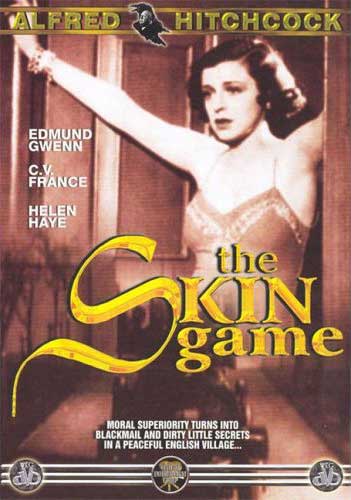
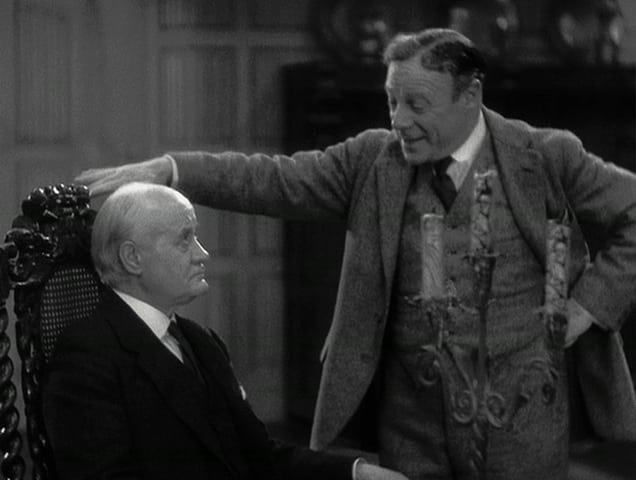
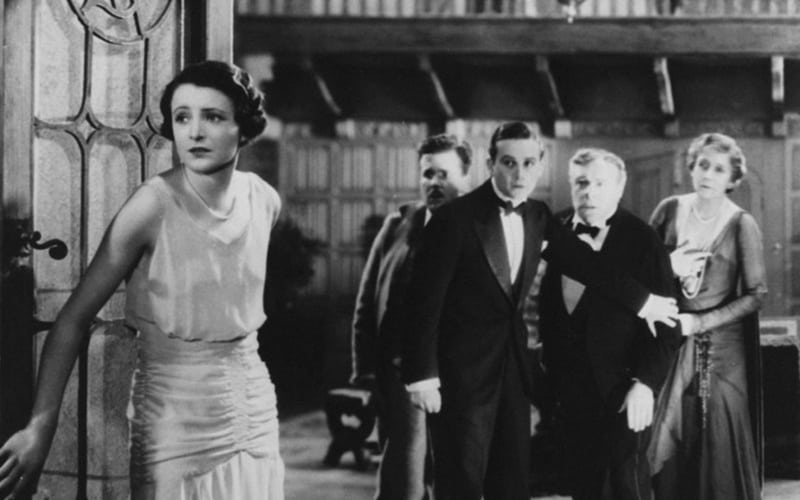

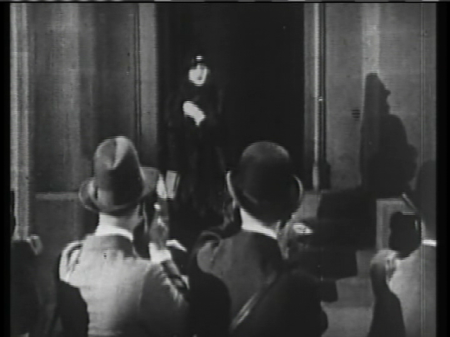
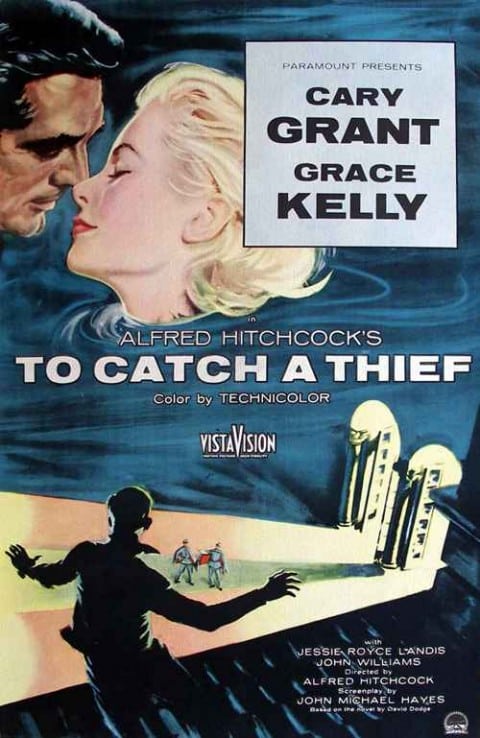
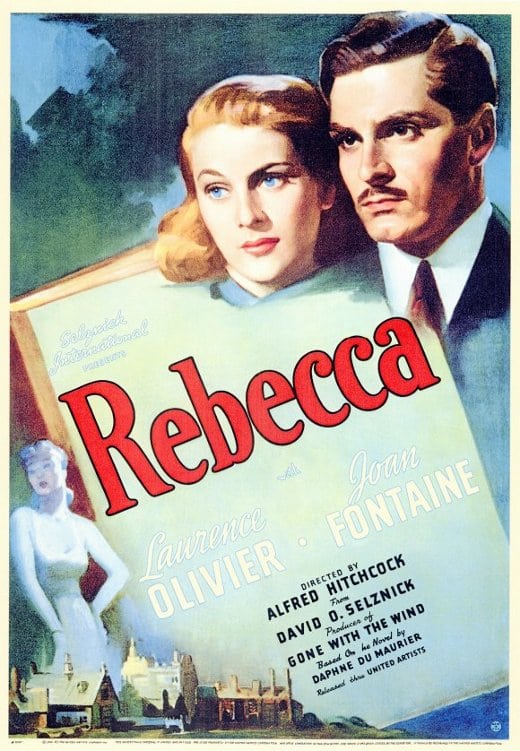
Be the first to comment